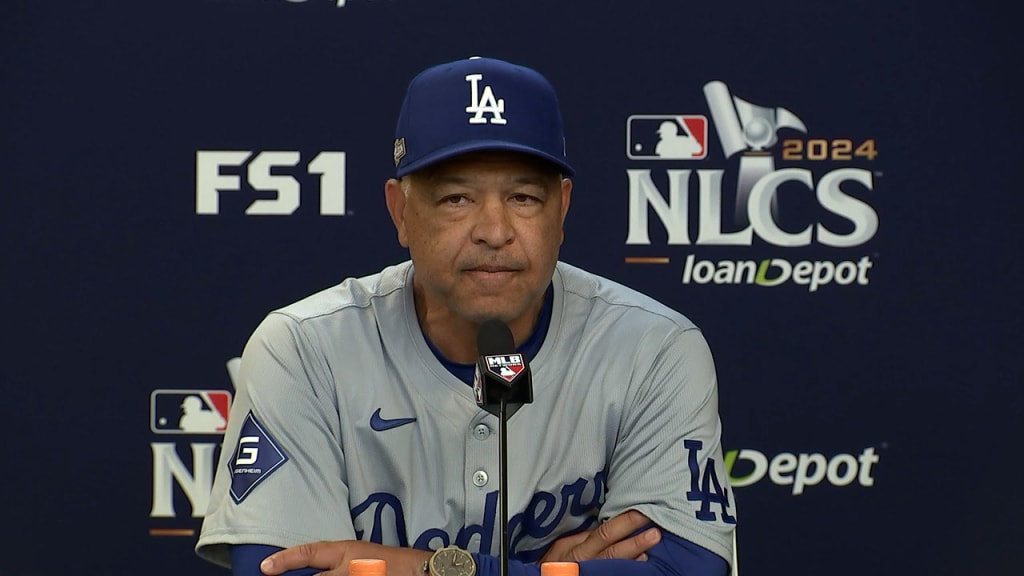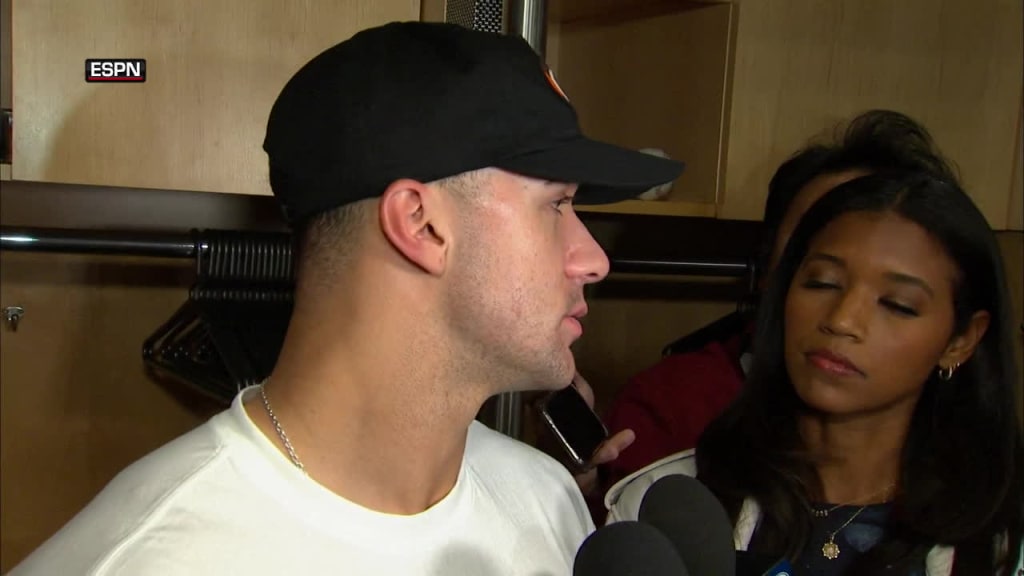Flaherty's ineffective start leaves Dodgers eyeing path to clinch in LA
This browser does not support the video element.
NEW YORK -- The Dodgers know what can happen when momentum shifts in a postseason series. They experienced that for themselves en route to their 2020 World Series title, erasing a 3-1 series deficit against the Braves in the National League Championship Series.
Before Game 5 of the NLCS on Friday, Dodgers manager Dave Roberts said the team would play with a sense of urgency despite the comfortable series lead. Roberts, of course, was a member of the 2004 Red Sox team that came back from a 3-0 deficit against the Yankees. The Dodgers didn’t want the series to go back to Dodger Stadium for Game 6.
Unfortunately for the Dodgers, Jack Flaherty had one of the worst starts of his career, and they were unable to close out the Mets following a 12-6 loss at Citi Field. Still, Los Angeles has to like its position: under the current 2-3-2 format, teams with a 3-1 lead playing Game 5 on the road have gone on to win the series 43 of 50 times (86%).
“It’s a long series,” said Dodgers third baseman Max Muncy. “It’s what we’ve been saying the whole time. They came out, punched us in the mouth. I thought we fought back pretty good. Ultimately, they kept adding on a little too much.”
Flaherty dominated the Mets with seven scoreless innings in Game 1, but it was obvious early that Flaherty didn’t have the same command or velocity on Friday. The right-hander allowed a leadoff single to Francisco Lindor and walked Brandon Nimmo to open the game. Two batters later, Pete Alonso jumped on a slider below the zone and sent it to straightaway center field for a three-run homer.
This browser does not support the video element.
“He wasn’t sharp, clearly,” Roberts said. “He’s been fighting something. He’s been under the weather a little bit. So I don’t know if that bled into the stuff, the velocity. I’m not sure.”
Whatever the issue was, things didn’t get any better for Flaherty in the third. The Mets sent nine batters to the plate and put up five more runs in the frame. The eight runs allowed by Flaherty matched a record for the most given up by a starter in postseason history.
This browser does not support the video element.
“I feel they made some adjustments, did a good job,” Flaherty said. “I feel like it was the first time in a while I let the game speed up on me a little bit, and I didn’t make the adjustments that I should have made in the game after the first inning, when they put a couple good swings on me. … They did a good job of making adjustments and I didn’t.”
Flaherty wasn’t landing his breaking pitches as successfully as he did in Game 1, recording just two swing-and-misses on Friday. Fastball velocity was also an issue for the right-hander. The 91.4 mph average on his four-seamer was the fourth lowest in any start of his Major League career.
This browser does not support the video element.
“Preventing their starters from going deep in games and getting to their bullpen, that’s huge, especially over this marathon type of a series,” Alonso said. “And as an offense, that doesn’t happen if you don’t have quality at-bats.”
Given where the Dodgers are with their pitching staff, that rings even more true. The Dodgers came into the postseason feeling a bit exposed with their pitching. But the lack of starting pitching depth has been masked mostly due to the bullpen’s success and the high-powered offense. But not having Flaherty get deep into the game exposed those issues and put the team in a difficult position.
This browser does not support the video element.
After two walks to start the third inning, Roberts, with his team trailing by two, warmed up left-hander Anthony Banda to possibly face Jeff McNeil. But after Starling Marte doubled to extend the Mets’ lead to 5-1, Roberts sat Banda and let Flaherty finish the frame. Roberts said given the point of the game, the team didn’t feel comfortable deploying one of its high-leverage relievers in that situation.
“Right there, looking at the game, we have five leverage innings, and so a couple of guys were down in [Ben] Casparius and [Edgardo] Henriquez,” Roberts said. “So you essentially have five leverage innings. You’re talking, we’re down 3-1 at the time and you can’t cover the game with leverage and being down. So you’re trying to get some outs.”
This browser does not support the video element.
Even with the Dodgers’ offense cutting the deficit to as little as four runs in the sixth behind two Andy Pages homers and a Mookie Betts solo shot, Roberts decided to lean on Brent Honeywell for the majority of the outs on Friday. Honeywell allowed four runs on six hits over 4 2/3 innings. That performance allows the Dodgers to go into Game 6 -- a bullpen game -- with all of their high-leverage arms fully available for multiple innings, if needed, even though it meant not giving the team the best opportunity to keep the game within reach on Friday.
“Obviously, I’m trying to keep us in the game a little longer,” Honeywell said. “Hitting three guys, I don’t think I’ve ever done that in my career. But we tried to claw our way back in. And let’s get back to L.A. We've got to win Game 6.”
This browser does not support the video element.
It was surely a missed opportunity for the Dodgers to punch their ticket to the World Series for the second time in five years and fourth in the past eight seasons. But now they’ll get two chances to win one game behind a pitching staff that got a much-needed reset on Friday.
“It's not always fun when you're going through it, certainly from anyone's chair, certainly my chair,” Roberts said. “But you have to kind of remain steadfast in how you use your pitchers, because ultimately, it's about winning four games in a seven-game series.”

